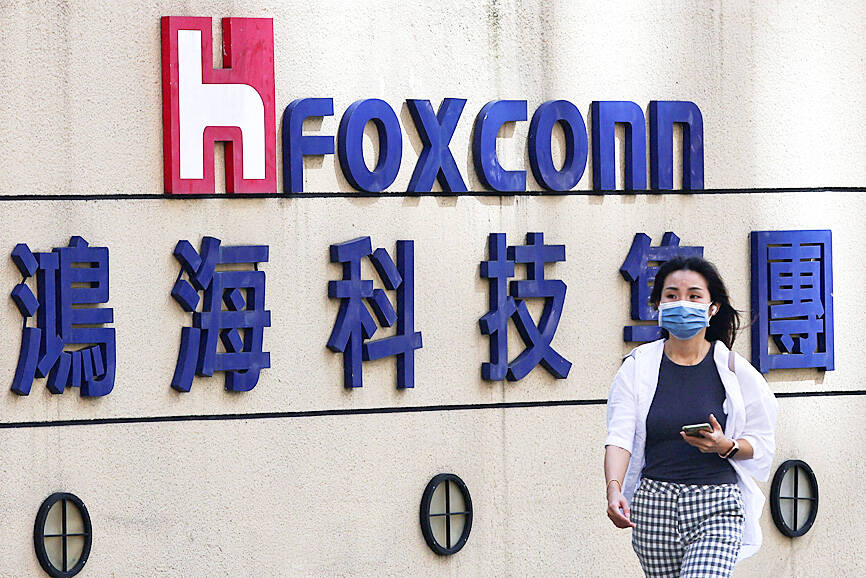Off to a slow start in the green energy game, iPhone assembler Hon Hai Precision Industry Co (鴻海精密) is looking to catch up and move toward meeting long-term emissions goals by investing in green energy funds and developing new types of alternative energy.
In an interview with CNA, Hon Hai chief environmental protection officer Hung Jung-chung (洪榮聰) said his company would need to use or buy 10 terawatt-hours (TWh) of green power a year worldwide by 2030 to meet its goal of cutting emissions by about 42 percent from 2020.
Hon Hai, also known internationally as Foxconn Technology Group (富士康科技集團), generated only 300 gigawatt-hours (GWh) in green power on its own worldwide last year, accounting for only 3 percent of the group’s total power consumption for the year, Hung said.

Photo: Ann Wang/Reuters
That is well off the pace of the goal it announced in April last year of having green energy account for no less than 50 percent of its electricity consumption in 2030, which would pave the way for reaching a goal of net-zero emissions by 2050.
To get to 10 TWh of green power, Hon Hai intends to invest more in green energy funds in China and Vietnam while forging partnerships in other parts of the world to gain access to all types of green energy, Hung said.
Another strategy is for Hon Hai to take stakes in foreign renewable energy developers and buy green power from foreign governments, which would help it secure green energy certificates and strengthen its bottom line, he said.
Meanwhile, weighing in on an issue that continues to spark debate in Taiwan, Hung said he was not opposed to keeping domestic nuclear power plants running as long as the nuclear waste was properly treated, because Taiwan needs stable sources of power.
Nuclear power could not be considered a renewable energy source, but it is a clean energy source without carbon emissions, he said.
Last month, President Tsai Ing-wen (蔡英文) reiterated the government’s goal to make Taiwan a nuclear-free country by 2025, by which time the 40-year operating licenses of all six of Taiwan’s operable nuclear reactors will have expired.
However, there are growing concerns that the phasing out of nuclear power will leave Taiwan vulnerable to power outages, especially as renewable energy development and even natural gas installations have fallen behind schedule.
On a smaller scale, Hon Hai is to increase the installed solar power capacity at its headquarters in New Taipei City’s Tucheng District (土城) to 716 kilowatt (kW) by the end of this year, from the current 65.3kW, Hung said.
According to Hon Hai, the headquarters consumed 18 GWh of power last year, and after its solar capacity expansion, it should generate more than 700 megawatt a year, or 3.8 percent of the total.
In addition to solar energy production, the Tucheng headquarters has also worked to cut waste by transforming it into energy, and the facility became the first factory to secure UL 2799, the highest platinum rating for zero waste to landfill, in Taiwan.

Macronix International Co (旺宏), the world’s biggest NOR flash memory supplier, yesterday said it would spend NT$22 billion (US$699.1 million) on capacity expansion this year to increase its production of mid-to-low-density memory chips as the world’s major memorychip suppliers are phasing out the market. The company said its planned capital expenditures are about 11 times higher than the NT$1.8 billion it spent on new facilities and equipment last year. A majority of this year’s outlay would be allocated to step up capacity of multi-level cell (MLC) NAND flash memory chips, which are used in embedded multimedia cards (eMMC), a managed

CULPRITS: Factors that affected the slip included falling global crude oil prices, wait-and-see consumer attitudes due to US tariffs and a different Lunar New Year holiday schedule Taiwan’s retail sales ended a nine-year growth streak last year, slipping 0.2 percent from a year earlier as uncertainty over US tariff policies affected demand for durable goods, data released on Friday by the Ministry of Economic Affairs showed. Last year’s retail sales totaled NT$4.84 trillion (US$153.27 billion), down about NT$9.5 billion, or 0.2 percent, from 2024. Despite the decline, the figure was still the second-highest annual sales total on record. Ministry statistics department deputy head Chen Yu-fang (陳玉芳) said sales of cars, motorcycles and related products, which accounted for 17.4 percent of total retail rales last year, fell NT$68.1 billion, or

In the wake of strong global demand for AI applications, Taiwan’s export-oriented economy accelerated with the composite index of economic indicators flashing the first “red” light in December for one year, indicating the economy is in booming mode, the National Development Council (NDC) said yesterday. Moreover, the index of leading indicators, which gauges the potential state of the economy over the next six months, also moved higher in December amid growing optimism over the outlook, the NDC said. In December, the index of economic indicators rose one point from a month earlier to 38, at the lower end of the “red” light.

MediaTek Inc (聯發科) shares yesterday notched their best two-day rally on record, as investors flock to the Taiwanese chip designer on excitement over its tie-up with Google. The Taipei-listed stock jumped 8.59 percent, capping a two-session surge of 19 percent and closing at a fresh all-time high of NT$1,770. That extended a two-month rally on growing awareness of MediaTek’s work on Google’s tensor processing units (TPUs), which are chips used in artificial intelligence (AI) applications. It also highlights how fund managers faced with single-stock limits on their holding of market titan Taiwan Semiconductor Manufacturing Co (TSMC, 台積電) are diversifying into other AI-related firms.